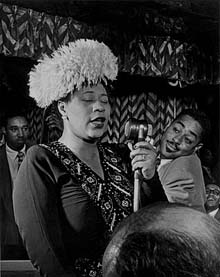Ella Fitzgerald andDizzy Gillespie
with Ray Brown and Milt Jackson,
Downbeat Club, NYC (1947) 

In the 1940s, while most Americans were dealing with the ramifications of the depression and World War II, William Gottlieb (who served as an Army Air Corp photo officer) sought refuge in the jazz clubs of New York City, where spirits soared and legends were created. Writing articles on the jazz scene for various publications including The Washington Post and Down Beat Magazine, Gottlieb started photographing in order to illustrate his columns, creating a history of the faces and people associated with jazz.
In 1948, Gottlieb put down his camera, abandoning the jazz circuit to pursue other creative venues. For more than thirty years his negatives remained in storage until he retired in 1979 and began the task of printing his vast archive. Shortly thereafter, The Golden Age of Jazz (now in its 12th printing) was published and Gottlieb, now retired, was busier than ever. Considered by many to be the greatest jazz photographer, Gottlieb's images of such legendary figures as Ella Fitzgerald, Billie Holiday, Dizzy Gillespie, Frank Sinatra, and Charlie Parker have become icons in the history of jazz. Distinguished by their storytelling qualities, his photographs transcend simple documentation, capturing the drama, intensity and vitality attached to the jazz art form.
Among the hundreds of images in his archive, we see an angelic Billie Holiday in profile, whose grace and pain radiates from her closed, strained eyes; a dapper Frank Sinatra with his hand on his hips in hypnotic concentration as the microphone stands inches from his mouth; a backstage look at Duke Ellington in his dressing room surrounded by his neckties, pressed shirts, baby powder and other sundries that characterized his suave nature; a crooning Ella Fitzgerald being adored by Dizzy Gillespie as her then boyfriend, Ray Brown, sits in the background glaring at him; a puffy cheeked Louis Armstrong looking into the camera. Whether singing, playing instruments, conversing backstage, overacting for the camera or in moments of contemplation and preparation, jazz's greatest performers displayed an air of ease and comfort for Gottlieb's camera. These are descriptive images which highlight the performers in their heyday, during the golden age of jazz.
Among the numerous awards and accolades bestowed upon William Gottlieb was the inclusion of more than two dozen of his images in Ken Burns's documentary, Jazz. In 1995, The Library of Congress purchased his original negatives, creating an archive for future generations to learn about the heroes of jazz -- America's greatest musical achievement.
In 1948, Gottlieb put down his camera, abandoning the jazz circuit to pursue other creative venues. For more than thirty years his negatives remained in storage until he retired in 1979 and began the task of printing his vast archive. Shortly thereafter, The Golden Age of Jazz (now in its 12th printing) was published and Gottlieb, now retired, was busier than ever. Considered by many to be the greatest jazz photographer, Gottlieb's images of such legendary figures as Ella Fitzgerald, Billie Holiday, Dizzy Gillespie, Frank Sinatra, and Charlie Parker have become icons in the history of jazz. Distinguished by their storytelling qualities, his photographs transcend simple documentation, capturing the drama, intensity and vitality attached to the jazz art form.
Among the hundreds of images in his archive, we see an angelic Billie Holiday in profile, whose grace and pain radiates from her closed, strained eyes; a dapper Frank Sinatra with his hand on his hips in hypnotic concentration as the microphone stands inches from his mouth; a backstage look at Duke Ellington in his dressing room surrounded by his neckties, pressed shirts, baby powder and other sundries that characterized his suave nature; a crooning Ella Fitzgerald being adored by Dizzy Gillespie as her then boyfriend, Ray Brown, sits in the background glaring at him; a puffy cheeked Louis Armstrong looking into the camera. Whether singing, playing instruments, conversing backstage, overacting for the camera or in moments of contemplation and preparation, jazz's greatest performers displayed an air of ease and comfort for Gottlieb's camera. These are descriptive images which highlight the performers in their heyday, during the golden age of jazz.
Among the numerous awards and accolades bestowed upon William Gottlieb was the inclusion of more than two dozen of his images in Ken Burns's documentary, Jazz. In 1995, The Library of Congress purchased his original negatives, creating an archive for future generations to learn about the heroes of jazz -- America's greatest musical achievement.










